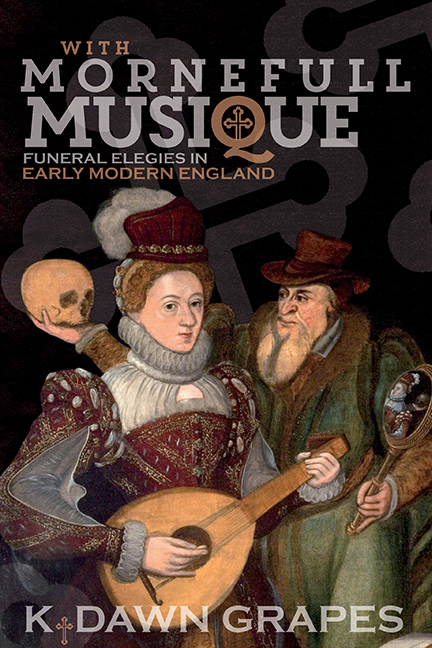 With Mornefull Musique: Funeral Elegies in Early Modern England
With Mornefull Musique: Funeral Elegies in Early Modern England Published online by Cambridge University Press: 17 October 2019
ON Friday the 19th of July in the year of 1588, Mrs. Mary Gascoigne gave birth to her thirteenth child. That same day, Mary died. She left behind few personal possessions and had no notable achievements. The likelihood that she should be remembered outside of her immediate family was slim. She should have been forgotten, and would have been, were it not for an early seventeenth-century manuscript collection, British Library, Add. MSS 18936– 18939, a set of partbooks that includes the consort song “For Death of Her.” An attribution in the cantus book reads, “Upon ye Death of Mris Mary Gascoygne, Dying in travell of child, an Epitaph. 19: Julye: 1588.” English composer William Cobbold (1560–1637) crafted the piece for solo voice and four viols. This consort song setting aptly provides a conservative, reverent accompaniment to the simplicity of an unidentified poet's words:
Upon ye Death of Mris Mary Gascoygne, Dying in travell of child, an Epitaph. 19: Julye: 1588
For death of her, that whylome liued here,
In such accompt reckoning of the best
As being dead, aliue doth still appeare,
through heavenly vertues tempered in her brest,
I know not well (though th[a]t lyes in my choyce)
Whether I should lament or else reioyce.
As evidenced in other musical funeral elegies, these songs were usually written for the elite, specifically men who had already received such renown during their lives due to social status, military accomplishment, or courtly endeavors that they assuredly required no additional posthumous tributes to establish ongoing legacy. As established in chapter 6, the few women for whom musical elegiac memorials survive were queens or members of the royal family, in the line of succession, or of especially high social status. Mary Gascoigne stood outside this top circle. For Mary, Cobbold's consort song provided an ongoing link to the life of a mostly unremarkable woman. The composer created a legacy for her, one largely overlooked in the last 425 years, but that still bears residual traces and begs many questions. The few articles on Cobbold (most well-known later as organist at Norwich Cathedral), consistently note this elegy, but there have not been any in-depth scholarly writings devoted either to the song or to the one it honors. Who was Mary Gascoigne and what might her life tell us about other women who lived at the time?
To save this book to your Kindle, first ensure [email protected] is added to your Approved Personal Document E-mail List under your Personal Document Settings on the Manage Your Content and Devices page of your Amazon account. Then enter the ‘name’ part of your Kindle email address below. Find out more about saving to your Kindle.
Note you can select to save to either the @free.kindle.com or @kindle.com variations. ‘@free.kindle.com’ emails are free but can only be saved to your device when it is connected to wi-fi. ‘@kindle.com’ emails can be delivered even when you are not connected to wi-fi, but note that service fees apply.
Find out more about the Kindle Personal Document Service.
To save content items to your account, please confirm that you agree to abide by our usage policies. If this is the first time you use this feature, you will be asked to authorise Cambridge Core to connect with your account. Find out more about saving content to Dropbox.
To save content items to your account, please confirm that you agree to abide by our usage policies. If this is the first time you use this feature, you will be asked to authorise Cambridge Core to connect with your account. Find out more about saving content to Google Drive.